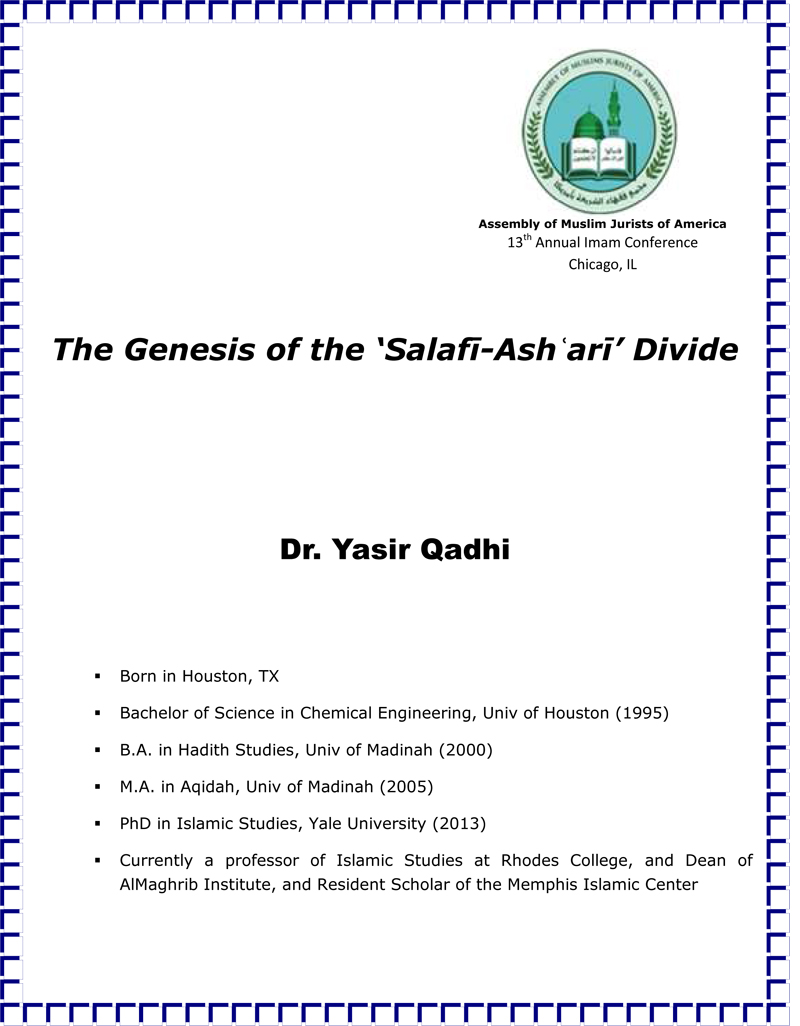
- Yasir Qadhi
- Assembly of Muslim Jurists of America
- 2016
- 16
- 9140
- 3427
- English
- 4396
The Genesis of the Salafi Ashari Divide
Early Islamic history saw the rise of a number of theological controversies, the most significant of which were: the criterion of selecting leaders and their function in society; the issue of defining faith (īmān); the effects of sin on salvation; and predestination versus free-will. Such debates amongst the nascent Muslim community led to the formation of groups that would later be identified as Sunnism, Shīʿism, Qadarism, and Khārijism.(1) For the first hundred years or so after the death of the Prophet, the issue of the nature of God and the question of how to understand scriptural references to the Divine Attributes does not seem to have surfaced. When that controversy finally did erupt in the middle of the second Islamic/eighth Christian century, it would take center stage for the next five hundred years, eclipsing and absorbing the earlier controversies, and resulting in the formation of at least half a dozen schools of thought. In fact, this issue would become so overarching that it would even render Sunnism asunder, and lead to the largest intra-Sunnī division, as manifested in two of its most prominent medieval champions:
Muḥammad b. Muḥammad al-Ghazālī (d. 1111 CE)(2), and Taqī al-Dīn Ibn Taymiyya (d. 1324 CE).
0
0 الإجمالي











 Afar
Afar Afrikaans
Afrikaans Akan
Akan Albanian
Albanian Amharic
Amharic Armenian
Armenian Assamese
Assamese Avari
Avari Azerbaijani
Azerbaijani Basaa
Basaa Bengali
Bengali Bosnian
Bosnian Brahui
Brahui Bulgarian
Bulgarian Burmese
Burmese Catalan
Catalan Chami
Chami Chechen
Chechen Chichewa
Chichewa Circassian
Circassian Comorian
Comorian Czech
Czech Danish
Danish Dutch
Dutch Estonian
Estonian Finnish
Finnish Fulani
Fulani Georgian
Georgian Greek
Greek Gujarati
Gujarati Hausa
Hausa Hebrew
Hebrew Hungarian
Hungarian Icelandic
Icelandic Indonesian
Indonesian Ingush
Ingush Japanese
Japanese Jawla
Jawla Kannada
Kannada Kashmiri
Kashmiri Katlaniyah
Katlaniyah Kazakh
Kazakh Khmer
Khmer Kinyarwanda
Kinyarwanda Korean
Korean Kurdish
Kurdish Kyrgyz
Kyrgyz Latvian
Latvian Luganda
Luganda Macedonian
Macedonian Malagasy
Malagasy Malay
Malay Maldivian
Maldivian Maranao
Maranao Mongolian
Mongolian N'ko
N'ko Nepali
Nepali Norwegian
Norwegian Oromo
Oromo Pashto
Pashto Persian
Persian Polish
Polish Portuguese
Portuguese Romani - gypsy
Romani - gypsy Romanian
Romanian Russian
Russian Serbian
Serbian Sindhi
Sindhi Sinhalese
Sinhalese Slovak
Slovak Slovenian
Slovenian Somali
Somali Swahili
Swahili Swedish
Swedish Tagalog
Tagalog Tajik
Tajik Tamazight
Tamazight Tashamiya
Tashamiya Tatar
Tatar Thai
Thai Tigrinya
Tigrinya Turkish
Turkish Turkmen
Turkmen Ukrainian
Ukrainian Urdu
Urdu Uyghur
Uyghur Uzbek
Uzbek Vietnamese
Vietnamese Yoruba
Yoruba Zulu
Zulu